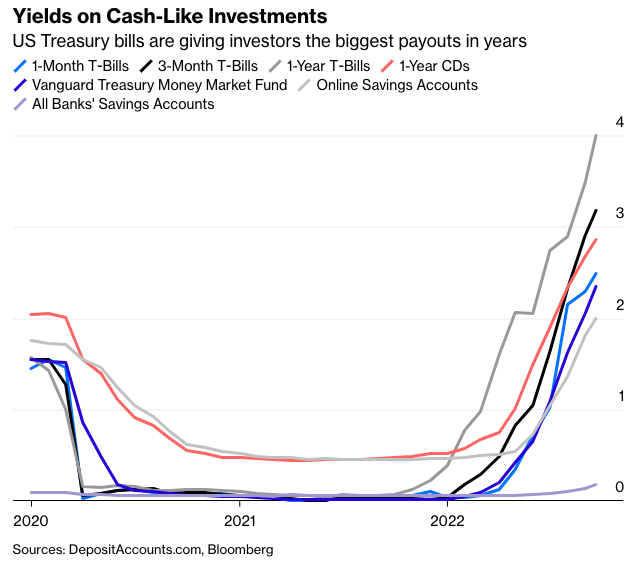If a long, ugly recession is in fact going to happen later this year, many investors will want to shift some additional money into cash. There’s good news: In July, yields on many cash-like investments, which means they're virtually risk-free and liquid, started soaring.
The best play right now may be short-term U.S. Treasury bills, or T-bills, which have been touted by the likes of Warren Buffett and Bill Gross. They're government bonds that mature in a year or less and are auctioned off periodically by the Department of Treasury. You can buy them directly at TreasuryDirect.gov, through a bank or broker, or you can invest in them more broadly using an ETF, such as the iShares Short Treasury Bond ETF.
The shortest-term T-bill lasts just a month and is offering a rate of 2.6%, according to Bloomberg data. Three-month bills are paying 3.2% and one-year bills a generous 4.1%. It was 0.04% on a one-month T-bill just a year ago, 0.02% on a three-month and 0.07% on a one-year.
Overall, T-bill yields are likely to respond faster to rate increases by the Federal Reserve compared to online savings accounts or CDs.

Notably, the yield on a one-year T-bill is higher than the yield on a 10-year Treasury note, which is 3.9%. That means investors are getting paid more interest for locking up their money for a much shorter period of time.
Remember, T-bills work differently than traditional bonds with longer maturities that pay interest semi-annually. With T-bills, an investor gets a discount upfront on the face value of the note and then receives the full amount of the bill when it matures. The difference between what you paid initially and what you get at the end of maturity is considered to be the interest.
For example, if a one-year T-bill has a rate of 4%, that means if you were to buy a $1,000 bill, you would pay $960 upfront and then get $1,000 at the end of the year—the $40 is the interest you receive for loaning the U.S. government money.
A side benefit of T-bills is that you don't have to pay state and local income tax on the interest you earn. If you're a high-income taxpayer in a high-tax state such as New York or California, that can be particularly attractive.
For investors worried about not being able to access their money right away like they can with a savings account, David Enna of TipsWatch.com offers a helpful strategy. He suggests scheduling and staggering purchases of 13-week and 26-week T-bills on TreasuryDirect.gov. That way you can benefit from rising rates, but still have access to your money within four weeks.








